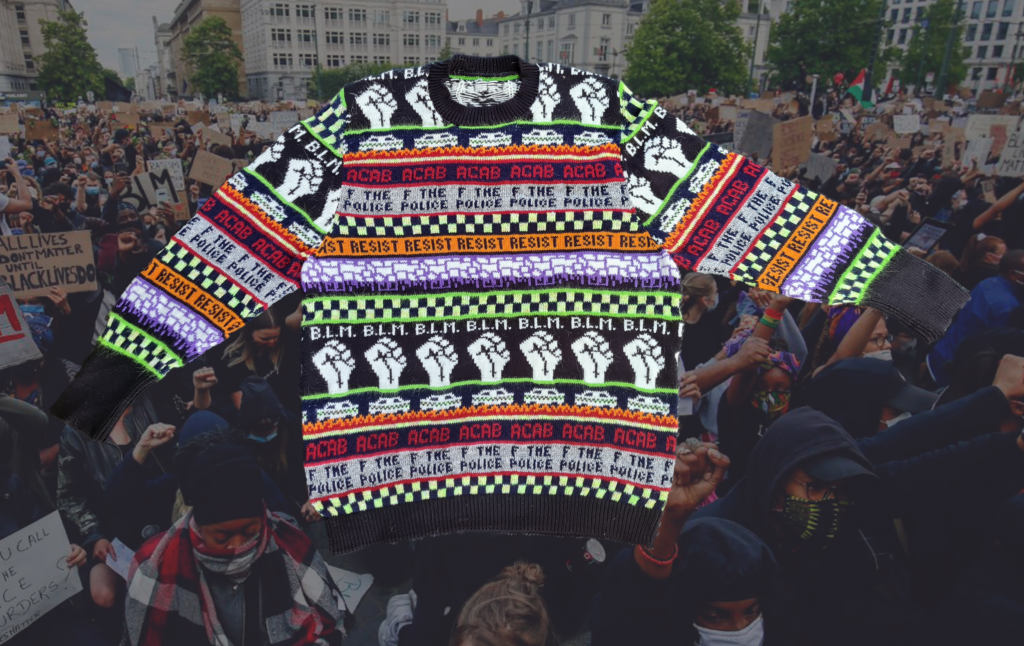Thanks to the pandemic, a broader range of local artists have been given the opportunity to present work at Perth Festival this year, resulting in two interesting and challenging exhibitions, writes Craig McKeough.
Local artists enjoy the spotlight
25 February 2021
- Reading time • 6 minutesPerth Festival
More like this
- This Angel soars, even on one wing
- Power of language written on the walls
- Oh! What an extraordinary experience
‘Fair Isle’, Emma Buswell, Mei Swan Lim, Angelina Boona Karadada, Joanne Hayward, Bo Wong and Rose Megirian (Wong x Megirian), Melissa McGrath and Kelly Fliedner (Semaphore) ·
DADAA Gallery, 19 February, 2021 ·
‘the hands should have no peace’, Pony (SA), Leila Doneo Baptist (VIC/WA), Claudia Nicholson (NSW), Jade O’Sullivan (WA), Andrew J Williams (WA) and Chiluba Young (WA) ·
Cool Change Contemporary, 24 February, 2021 ·
The border closures have forced a different-looking Perth Festival across the board. Even in the visual arts, it has meant a dominance of local artists, giving practitioners who might not normally get a look in on the Festival program a bigger, broader audience.
Perhaps inevitably, this means the standard will be mixed. But two of the smaller gallery spaces have pulled together interesting and challenging group exhibitions for the Festival that showcase mainly local artists in a wide variety of media.
Curated by Katherine Wilkinson, “Fair Isle”, at the DADAA Gallery in Fremantle, is a small collection of pieces that sit at the intersection of contemporary art, craft and design. The six makers represented use a mix of traditional practices to tackle personal issues and bigger political ideas.
Emma Buswell’s work gained prominence beyond the confines of the art world in the past year when she reimagined Premier Mark McGowan’s Covid-inspired quip last April about going for a run and getting a kebab as a knitted jumper. That piece, which was purchased by the Art Gallery of WA, is here, along with a selection of Buswell’s other eye-catching wearables that reflect on last year in politics and current events – bushfires, the US election, the Black Lives Matter rallies and more.

Mei Swan Lim takes a more personal approach, with her long hand-woven wall hangings, A Series of Interruptions, a witness to her life as a mother of a young son.The shifting design and colours of the weave reflect the stop-start reality of trying to balance an art practice with domestic and family demands.
There were technical troubles on the day we visited and Joanne Hayward’s installation The Memory of Water, which depicts water as both a carrier and an archive of memories, wasn’t working fully. The idea of the work is to let the dripping water run through your fingers as it collects in a stone bowl, adding your own memories to the repository. Unfortunately there was no dripping water which took away the central tenet of the piece. The accompanying audio of Hayward talking about the project and the restorative and life-giving power of water is quite mesmerising although the volume at which it is set tends to dominate the small gallery space. Offering headphones for those specifically interacting with the work may have been a better option for a more intimate experience.
Hands are also the focus at Cool Change Contemporary in the Perth CBD, which makes its debut as a Perth Festival venue. Co-curated by Aisyah Aaqil Sumito and Grace Connors, the group show “the hands should have no peace” offers a rumination on matters of grief, building on a passage in the Toni Morrison novel, Sula, which discusses the visceral, physical aspects of grieving.
It’s a promising premise but it doesn’t always meet its ambitions, partly because of an apparent lack of coherence between the works and the way the six artists represented respond to the theme.
Of course, grief is highly personal, comes in many guises and has many causes. But I found it difficult to draw any real connections between the disparate works, including paintings, small sculptures, photographs and performance video with their sub-themes of environment, racism, homophobia and post-colonial dispossession.
The works that stand out for their quiet lyrical beauty are the photographs and video by Chiluba Young, who explores lesbian relationships between black African women. The video work, Lovers Dance, combines lovely imagery with simple but moving poetry and a joyous dance sequence in a most uplifting way.
Jade O’Sullivan’s acrylic paintings at first appear a confused jumble of intense primary colour and shape, the actual images lost within. But they reward time and closer inspection as a narrative emerges of the grief among Indigenous people as a result of European invasion. This is a grief that persists, abetted by political and social ignorance.
Despite the somewhat fractured nature of this exhibition, it is great to see a small artist-run collective embraced by the Festival, raising its profile and offering an important platform to emerging local artists.
‘Fair Isle’ continues at DADAA as part of Perth Festival until 17 April, 2021.
‘The Hands Should Have No Peace’ is at Cool Change Contemporary as part of Perth Festival until 27 March, 2021.
Jade O’Sullivan & Olive, ‘Kaartijin’; ‘Land Bridge’, framed acrylic on canvas, 950 mm x 950 mm each. Photo: Mayma Awaida
Like what you're reading? Support Seesaw.





